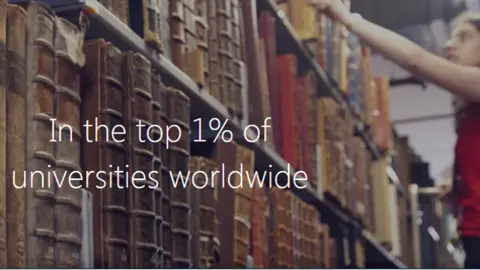Universities challenged on top 1% advert
 BBC
BBCUniversities in the UK are being challenged over marketing claims to students that they are in the "top 1%" of the world's universities.
The University of Reading is going to have to take down such a claim after a complaint to the advertising watchdog.
University rankings are increasingly influential for recruitment, particularly for overseas students.
In the new World University Rankings, the top three are US universities - MIT, Stanford and Harvard.
Cambridge is the highest ranked UK university, with three other UK universities in the top 10 of this global league table.
Advertising to students
But the Advertising Standards Authority has been examining a complaint about how university rankings are used in marketing.
A description of the University of Reading as being in the top 1% worldwide had been challenged by a complainant, who said such a figure could not be substantiated and could be misleading.
The advertising watchdog says that this has been "informally resolved", with the university agreeing that it will remove the claim, without going ahead with a formal investigation or ruling.

Top 10 QS World University Rankings
- Massachusetts Institute of Technology (MIT)
- Stanford
- Harvard
- California Institute of Technology (Caltech)
- Cambridge
- Oxford
- University College London
- Imperial College London
- Chicago
- ETH Zurich

There are many different university rankings, including for individual subjects as well as for institutions, and the results are often used as evidence of international status.
And the challenge over how such rankings are used in marketing will have implications for many other universities.
Southampton uses the claim "In the top 1% of universities worldwide" on its website, Liverpool says it is in the "top 1%" and Queen's University Belfast describes itself as "In the top one per cent of world universities."
Charles Heymann, the University of Reading's head of corporate communications, welcomed the clarification over how universities can present global rankings.
 University of Reading
University of Reading"It now needs to investigate every single other UK university which claims it is in the top 1% in the world, rather than waiting for individual complaints to be made," he said of the ASA.
Mr Heymann said that Reading was in the top 200 of the Times Higher Education and QS rankings.
"Like dozens of other UK universities in recent years, we judged this put us in the top 1% out of an estimated 20,000 institutions internationally," he said.
"We accept, though, the ASA's view that this could not be proved given no league table assesses every single university worldwide."
London top city
The latest annual findings of one of the most high profile rankings have been published, listing almost 1,000 universities.
The QS World University Rankings shows the Massachusetts Institute of Technology (MIT) once again rated as the world's best, with the top three unchanged from last year.

The rankings take into account factors such as research publications and citation, the views of academics and employers and levels of international engagement.
Cambridge, Oxford, UCL and Imperial are all in the top 10, but there has been an overall downward trend for UK universities.
There are 76 UK universities in the international rankings, but the compilers say 51 of them are in a lower place than last year.
But London has among the highest concentrations of top universities, with four universities in the top 50 and 17 in the overall rankings.

QS World University Rankings: UK universities in the top 200
5. Cambridge
6. Oxford
7. University College London
8. Imperial College London
23. King's College London
23. Edinburgh
34. Manchester
35. London School of Economics and Political Science
44. Bristol
57. Warwick
65. Glasgow
78. Durham
82. Sheffield
84. Nottingham
84. Birmingham
92. St Andrews
101. Leeds
102. Southampton
127. Queen Mary, University of London
135. Lancaster
135. York
137. Cardiff
158. Aberdeen
158. Exeter
160. Bath
161. Newcastle
173. Liverpool
188. Reading

Ben Sowter, head of research for the QS rankings, says that he is confident that the University of Reading could be described as being "amongst the top 1% in the world".
He says that there are estimates of 20,000 and 26,000 for the number of universities in the world.
But he says that any institutions rated in the top 200 of the World University Rankings would be in this top 1% worldwide.
Nick Hillman, director of the Higher Education Policy Institute, blamed a lack of funding for the overall slip in rankings for UK universities.
"The competitiveness of UK universities has been affected by austerity. In particular, tuition fees have been frozen for five years and research funding has not grown as fast as in some other countries," said Mr Hillman.
